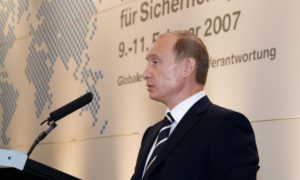The U.S. Is Planning for the Aftermath of Ukraine War
According to the Rand Corporation, there are two scenarios for the United States: “after” the less favorable war or “after” the more favorable war.

The prominent think tank for U.S. policymaking recently published a long report on the so-called aftermath of the war in Ukraine.
Washington and its NATO allies have to admit that the U.S. is losing another proxy war together with its satellite states of Europe. Previously they lost in Afghanistan (after more than 20 years, a second Vietnam), also recently in Syria and Iraq, and now in Ukraine.
Even so-called “Russia experts” in Europe admit that Ukraine is losing.
“I do not rule out that Ukraine will lose the war this year. Europe has misjudged the Russian army,” says Belgian “Russia expert” Joris van Blade to De Standaard. Russia has the initiative again and the Russian people are not going to stop the war, he thinks. “We have missed historic opportunities to make Europe safer.”
According to the Rand study, two scenarios are possible: a so-called “hardline” or a “softline” postwar. Of course, the U.S. prefers a softline postwar outcome, where they still have room for manipulation and possible coup d’état and Balkanization (partition) of Russia just like they did in former Yugoslavia. According to Rand, the U.S. military presence in Europe has increased to around 100,000 personnel since the start of Russia’s Special Military Operation in February 2022.
The United States deployed attack aviation from Germany to Lithuania; Patriot air defense systems from Germany to Slovakia and Poland; and F-15 tactical fighters from the United Kingdom to Poland. In addition, European countries are sending F-16s to Romania, as the Netherlands recently indicated. These F-16s are capable of attacking Russian cities. Washington characterized these deployments as part of a wartime surge to deter Russia from expanding its aggression beyond Ukraine to attack U.S. allies in Europe.
Leaders in Europe are almost hysterical. One after another, they proclaim that Russia is going to invade Europe, starting with Moldova, the Baltic States, and Poland. The Netherlands, Germany, and France are warning their people to expect an attack from Russia, as is Sweden, which recently joined NATO.
The population is being frightened by the unhinged rhetoric of their politicians. Conscription should be reactivated and Germany even has a concept ready to recruit migrants (about 1.5 million serviceable men) and entice them to get a passport.
European leaders are also concerned about the upcoming elections in the U.S. after Republican contender Donald Trump made comments suggesting he would quit NATO and let Europe fend for itself. They are worried that the U.S. might abandon them.
During a recent NATO conference in Brussels, a lot of war rhetoric was spoken. “We live in an era where we have to expect the unexpected,” said Dutch NATO Admiral Rob Bauer. Meanwhile, the Danish and German defense ministers have warned of a potential war with Russia within five years.
The U.S. and European leaders assume the “hardline” scenario is likely in the next few years. They proclaim through their mouthpieces in the corporate-controlled news media that Russia is becoming much more “risk-acceptant”. Therefore, it is calculated that a hardline approach may increase NATO’s ability to deter purported Russian aggression.
It’s that time of year again for the hawkish Munich Security Conference, in Bavaria, Germany. This is the forum where President Putin provoked alarm when he gave his famous speech in 2007, making it clear that the unipolar world was over and a multipolar world would emerge in the foreseeable future. Putin’s prognosis caused much chagrin for Western leaders.

This year’s theme at Munich was animated by Trump’s supposed undermining of NATO. The appeal for support from the U.S. has become more urgent among some European politicians. Ukraine lacks weapons and ammunition, they openly say. Russia is sometimes five times superior on the battlefield. In addition, a U.S. support package worth around $60 billion was approved by the Senate but the Republican-dominated House of Representatives could reject it – and so far it looks like it will.
Europe, in turn, would not be able to fill this gap and, therefore, Ukraine will lose the proxy war for the U.S. and the West.
In addition to the presence of Ukrainian President Vladimir Zelensky, the European leaders and lobbyists had also the opportunity in Munich to lobby Republican Senators and Representatives to support Ukraine (with money). Nowhere outside the U.S. can you find as many American politicians in one place as at the Munich Security Conference this year.
The actor-President of Ukraine Zelensky desperately wants to secure future European support. Zelensky’s participation in the conference was highlighted by a fierce speech and his conclusive remark: “Do not ask Ukraine when the war will end. Ask yourself why Putin is still able to continue it”.
Last year, he opened the most important meeting of Western politicians and experts on security policy via video address. Now he took part in person for the first time since the Russian Special Military Operation began almost two years ago. He is afraid for his position; he is losing the proxy war on behalf of the U.S. and EU/NATO.
U.S. Vice President Kamala Harris was attending the Munich conference instead of Joe Biden. Rumors are circulating in the Western media that Biden’s cognitive condition has deteriorated even more and he was unable to come. If Biden wins the November presidential election, will Harris become the next president upon his inevitable retirement during a second term? That’s probably the intention.
As President Putin said, he would rather have Biden than Trump as the winner. In his diplomatic way, he said that Biden is an “old school” politician, meaning of course that a Democratic government with Biden/Harris is easier to understand and estimate than Trump, who is capricious and unpredictable.
These are the facts: the presumed hegemony of the Western states is falling to pieces. The “Collective West” is losing its wars. Their status and economies are in a downward spiral, even before the Special Military Operation.
The politicians and the elites who stand behind them, the World Economic Forum (WEF) and other semi-international organizations (usually Western-oriented) want to compensate for this historic loss of the unipolar world with a new system, away from fossil energy, ostensibly for the climate, but actually to try to weaken and isolate Russia by destroying its economy based on copious oil and gas resources.
European so-called leaders, in fact, vassals of the U.S., have slavishly followed the agenda of creating a new Cold War, which could turn into a hot war. Instead of betting on diplomacy, they have chosen the path of war, in contradiction to the (Western) UN Agenda 2030, where Western countries have forced this agenda on the Global South. This agenda also states that we need to strive for peace and prosperity for everyone. So it is yet another lie from the Global West, or rather the empire of lies, which is now submerged in its own lies.
yogaesoteric
February 26, 2024
